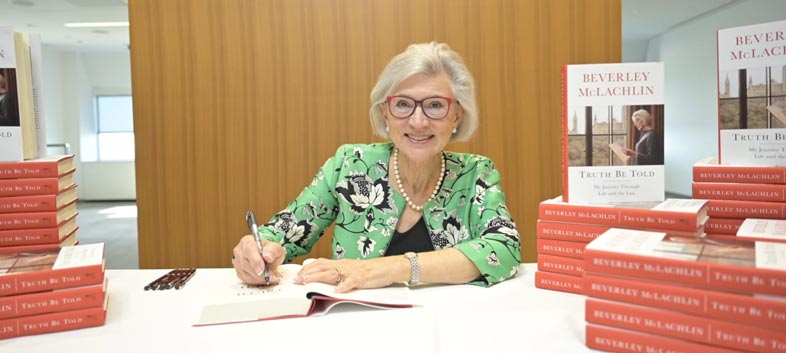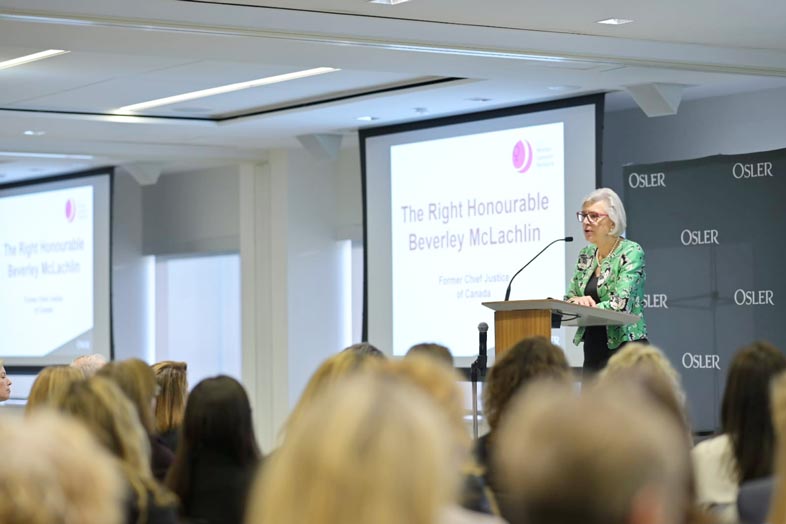Nov 5, 2019

The Osler Women Lawyers Network (OWLN) works to promote diversity and support women by organizing initiatives that encourage knowledge sharing, networking and discussion – as well as the chance to hear about and learn from the experiences of extraordinary women.
In that vein, on October 10, 2019, the OWLN hosted the 5th Annual Women’s Event, a much-anticipated reception that featured a keynote presentation from the Right Honourable Beverley McLachlin – truly one of Canada’s most extraordinary women. Beverley served as Chief Justice on the Supreme Court of Canada from 2000 to 2017. She was the first woman to hold that position as well as the longest serving Chief Justice in Canadian history.
After leaving the bench, Beverley turned her hand to writing – she started with a courtroom thriller that she recently discussed in The Globe and Mail with prolific lawyer-turned-novelist John Grisham, and then followed up with a just-released memoir. “Truth Be Told: My Journey Through Life and the Law” offers an intimate look at her life – from her early days in the foothills of Alberta to her ground-breaking role on the Supreme Court where she was instrumental in shaping the social and moral fabric of the country.
The electricity in the room was palpable as Beverley addressed a “sold out” audience of Osler partners, associates, personnel, staff, alumni and clients. In his opening remarks, National Managing Partner Doug Bryce noted that it was the first time the entire firm conference centre was reserved for a single event.

Reading excerpts from her book that highlighted her sometimes challenging experiences as a woman in the legal profession, the inspiring jurist touched on a broad range of topics. She began by giving context to her achievements by reminding the crowd of the significance of the Persons Case in 1929 where five Albertan women appealed to the Privy Council in a bid to be recognized as “persons” and therefore able to hold public office – a decision the papers of the day predicted would lead to the “demise of civilized society.”
The remainder of Beverley’s speech was peppered with stories about how she overcame the odds in a profession where there were few women and eventually rose to the position of Chief Justice of the Supreme Court. She self-deprecatingly described her inauspicious start when her grade 8 teacher provided her with the results of an aptitude test. The teacher said to Beverley, “You have an extremely high reading retention score, but that won’t do you much good … as a girl.” Worse, she continued, she was also told that her “very low alertness score” made her an inappropriate candidate for most of the six career options available to women at the time: teacher, nurse, secretary, telephone operator, waitress, and stay-at-home wife and mother.
Undeterred, Beverley obtained an undergraduate degree in philosophy at the University of Alberta in Edmonton. Her plan was to do graduate work and then teach, but a good friend suggested she think about going into law – a path she hadn’t considered since she had never heard of a woman lawyer. Beverley sent a letter to the Dean at the University of Alberta’s Faculty of Law, asking for information about the program. To her surprise, instead of an information package, she got an offer of admission by return mail – early “affirmative action,” she commented wryly.
There were only five or six women in her law school class and when Beverley was looking for an articling position, she had to contend with the general view that “married women should not work outside the home” – despite having graduated at the top of her class. Ultimately, she succeeded in practice and as an academic until she became a jurist. In 1989, she was sworn in as the third woman on the Supreme Court: “What took us so long? And what is still holding us back?” The audience responded with laughter when she described how, at her swearing in, the Right Honourable Bertha Wilson, one of the other two women on the Court, said, “Three down. Six to go.”
In her time on the bench, Beverley championed such important issues as access to justice, same-sex marriage, truth and reconciliation, and medically-assisted dying. She is proud of the progress that has been made, but points out that in many areas, we “still have a long way to go.” Since stepping down, she continues to advocate for change and has developed a following of both legal and non-legal fans.
After Beverley’s keynote address, those in attendance were invited to ask questions. The Osler audience rose to the occasion and inquired about a number of topics, from the case the former Chief Justice is most proud of (she mentioned the Quebec secession reference) to wondering about her role models and the most important quality new lawyers can bring to the job (answer: resilience – “growing up on a ranch, I learned early on that the world is not easy”).
In thanking Beverley for her remarks, Sonia Bjorkquist, Chair of the firm’s National Litigation Department, noted that the former Chief Justice has touched everyone in the room, “as an advocate, judge and leader.”
Colleen Moorehead, Osler’s Chief Client Officer, then invited the audience to take advantage of the opportunity to visit and network with the women participating in the Osler Marketplace – a great venue to discover more about the products and services available from female entrepreneurs.
Stay tuned for other OWLN events dedicated to encouraging and supporting the advancement of women.